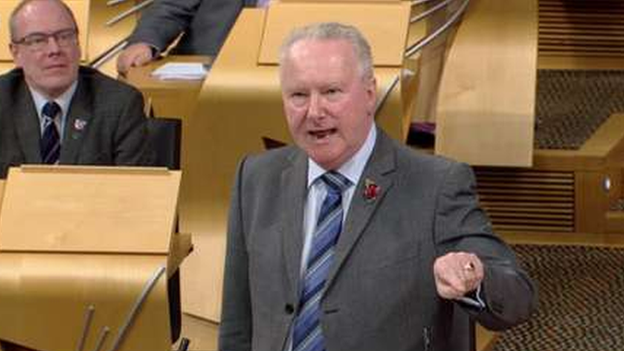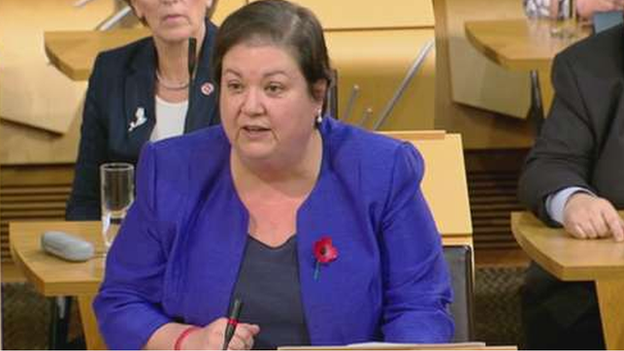Tax credits and the pantomime dame
- Published

Alex Neil's performance was compared to a 'pantomime dame'
Do you remember the so-called bedroom tax? Well, of course you do. It was a substantial political and social controversy with significant impact.
Today at Holyrood there were repeated attempts to compare the controversy over the bedroom tax with the current arguments over efforts by the Chancellor to curb tax credits for working families.
In a debate, the social justice secretary Alex Neil said that the withdrawal of assistance for the low paid resembled the bedroom tax in that it was an example of inimical Conservative behaviour with a serious impact on the less-privileged.
Yes to that, said Labour. But they added a comparator of their own. They said that the Scottish government's response to the tax credit moves reminded them of the debate over the bedroom tax when, according to Labour's Jackie Baillie, the SNP had "to be dragged kicking and screaming" to act.
Certainly, one recalls that John Swinney initially cast doubt on the capacity of Holyrood to act in full over the bedroom tax. And he suggested at one point that he did not want to let Westminster off the hook by capitulating too swiftly and moving into a mitigation phase.
Similarly, this afternoon, Mr Neil said it was too early to abandon the fight for the full devolution of welfare powers which would, he argued, forestall the problem of tax credits entirely.
He delivered that case with his customary aplomb. (Ms Baillie had suggested in advance that it would be a "pantomime dame" performance from the minister. Which is just unkind. Although funny. Even Mr Neil laughed. A little.)

Labour's Jackie Baillie said the SNP was slow to act on the bedroom tax
But he was perhaps a little less sure-footed when dealing with the scope of Holyrood's powers. His debate amendment continued the line that there was a gap, that the Scottish Parliament lacked the full ability to act, even with the new powers.
However, he then noted that new amendments to the Scotland Bill had just been tabled at Westminster. Challenged by Murdo Fraser for the Tories, he suggested that they did, finally, give Scotland the clout over welfare which had been required. Cue Labour points of order demanding that he withdraw his debate amendment.
Mr Fraser meanwhile reminded us of the Conservative argument that the scope of tax credits had become far too broad - and that welfare provision required reform.
Such was the political debate. What though will happen to the families in need? Mr Neil said that an assistance package there would be. From the Scottish government. But only once the chancellor had produced his amended plans - delayed by the Lords - and Scottish ministers had a chance to respond, in detail and in a planned fashion. He said that Labour's package was flawed and incomplete.
In the Commons, the Scottish Secretary David Mundell indicated that he disagreed with Labour's line on tax credits - but he agreed with their right to say it. (As Voltaire nearly said.) Further, he agreed that Holyrood had the power.
Only, he didn't quite say that. It had been widely anticipated - not least by Labour - that he would. The feed line was delivered deftly by Labour's front bench in the Commons.

Tax credits for families was the focus of debate at Holyrood
But Mr Mundell didn't quite, in terms, state in the Commons that Holyrood now had the clout. Instead, he praised Kezia Dugdale for having the guts to act by contrast with what he plainly believed was pusillanimity on the part of the SNP.
It was left to a subsequent statement from the Scotland Office to make it "crystal clear" that Holyrood can now act.
However, there is another element to this which probably explains the caution inside the Scottish government. For, caution there evidently is.
That element is the fiscal framework which accompanies the transfer of new powers. It is still being negotiated - with hard, if courteous, bargaining on either side. Indeed, Mr Mundell was repeatedly questioned in the Commons by Angus Robertson and others with regard to the timetable.
The thought of autumn publication has vanished like the leaves off deciduous trees. As this site noted previously, we are looking more probably at early next year.
John Swinney does not want to make commitments - especially costly commitments - before he knows the full story. Before he knows the full powers, before he knows the full extent of the cuts to tax credits, before he knows the scope of the concomitant fiscal framework.
Which left the Scottish government sounding just a mite discomfited at various points today and since Labour announced its policy on Saturday. But there will be more to come, there will be other days.
So is this story done and dusted? Oh, yes it is? Oh, no, it isn't. Just listen to Alex Neil.
- Published4 November 2015
